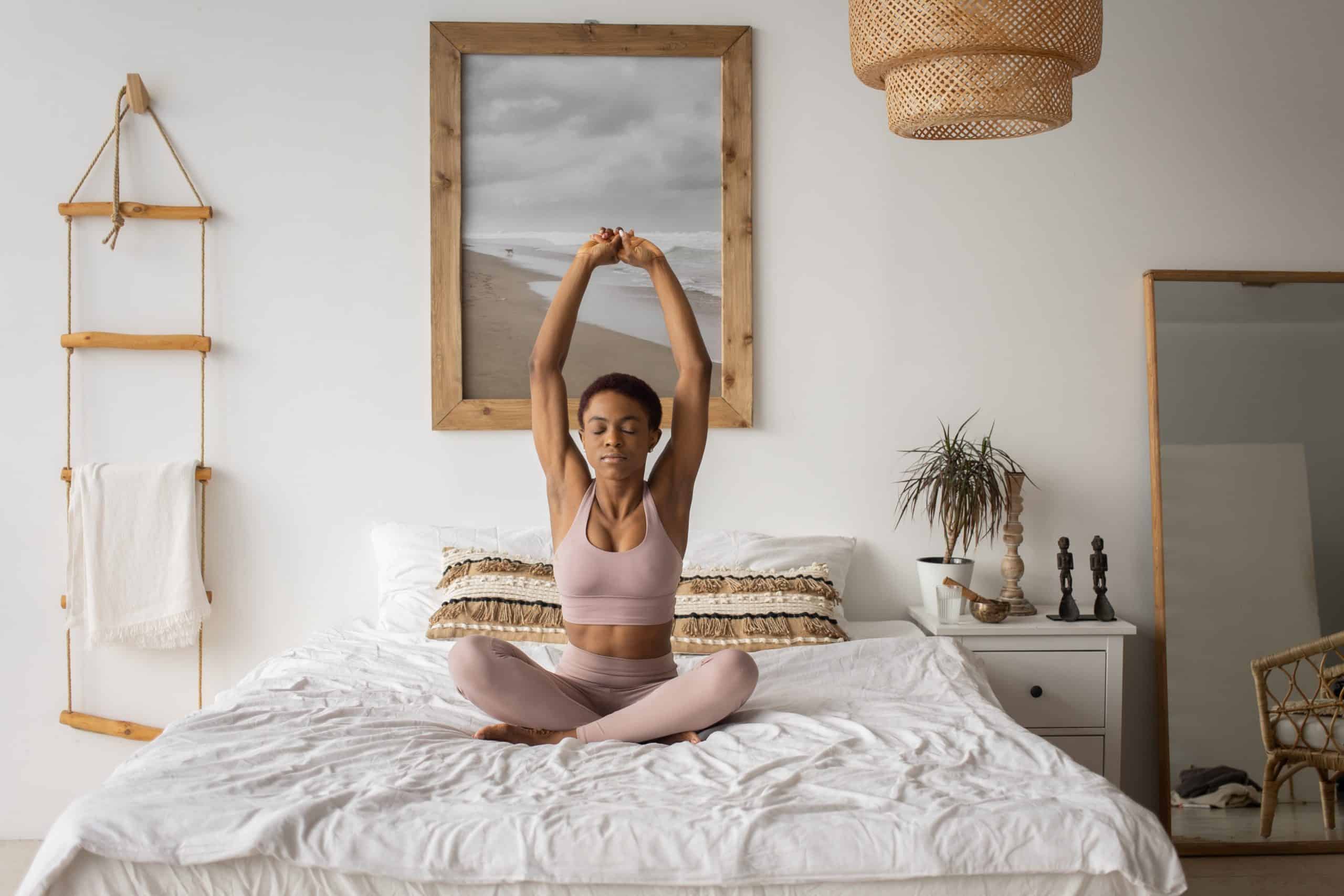How to Meditate in Bed for Beginners
Meditation has proven to help with sleep, even to the extent of alleviating insomnia. For those of us who want all of the benefits of meditation but struggle to integrate a regular practice into our day, it can be very helpful to time our first meditation around our morning waking routine to help us feel rejuvenated and alert for the day.
In this post, we’ll talk about meditating in bed, how meditation impacts insomnia and sleep, and how to schedule your meditations to best aid your sleep.

Why do we get insomnia?
There are two expressions of insomnia. One is when a person has trouble falling asleep, and the other is when the person has trouble staying asleep through the night. The reason for both issues with sleep hasto do with the accumulated stress in our body.
When we discuss stress in terms of the Vedic Worldview, we mean that the body stores stress memories physically in the body that affect our mind, emotions, and physiology. The method of stress storage is a way our brains try to protect us from experiencing stressful situations. Since we are for the most part no longer living in a survival situation in our day-to-day life, this functioning of the brain can easily store stress triggers that are arbitrary.
Imagine if you experience a hard conversation in a beautiful park with a band playing in the distance. You are physically safe, but your emotions feel attacked and traumatized. Your brain then stores all of the sensory inputs of that situation as related to this very stressful experience.
That means that whenever you walk through the same beautiful park, hear the same kind of music, smell the same smells, or even hear that person’s name again, your brain and body will experience a stress response.
Stress and the brain
Our brains store stress physiologically every single day, from the most minor stressors to the most major. This means we’ve been accumulating stress memories that put our nervous system on high alert for decades. Though there are many ways to change your state in the present moment from one that feels stressed to one that feels calm, you cannot remove the stress memory from your physiology with any amount of distraction or concentration.
Throughout the day, when our bodies are overwhelmed with stressful memories, we’ll experience racing thoughts, anxiety, lack of focus, and incessant thinking. We’ll be unable to be present or calm down, and we’ll have trouble feeling clear about our actions or our lives.
When it comes time to go to sleep, the stress is still present, so the thoughts do not slow down. Our entire nervous system is wired and overwhelmed by stress, which makes it very difficult for the body to relax enough to sleep.
It’s almost like asking the body to sleep when it thinks it’s being chased by a tiger.

Start your Meditation Journey Today
ATTEND A FREE INTRO TALKReleasing Stress Through Sleep
When we actually can get to sleep, our bodies are supposed to be organizing information, healing, resting, and reducing the stress load we experience when we’re awake. There is a hypo-metabolic state that we can reach when we’re asleep that allows the body to release stress.
But the nature of stress release is that it activates the mind and occurs as a signal in the nervous system. So once we’ve finally fallen asleep and start to release the entire inventory of stress pressuring our body and consciousness, that stress release activates the mind and wakes us up.
So you go to bed and you may have trouble falling asleep because of your swirling incessant thinking. Then when you do fall asleep, the body begins to rest in this hypo-metabolic state. Then, an entire inventory of stress starts to be released from the body, which is a very, very good thing. But when that happens, because of the wholesale restorative process of this stress release phenomenon, it begins to activate the mind.
And so during the process of stress release, you can actually pull the mind into wakefulness and wake up in the middle of the night. Then, it’s two or three in the morning and you may think that something terrible has happened because you’re suffering from insomnia and there must be something wrong.
This response is actually the body doing what it needs to do in terms of looking for stress release. It is unfortunate that it disrupts your sleep, but at least we know exactly why it is that it happens.
The stress is what causes us to have trouble falling asleep at night, and then the stress release wakes us up. So in both cases, it is stress and accumulated stress that causes poor sleep, insomnia, and wakefulness in the evenings. And so many people will look for meditations to do right before bed to fall asleep, and it’s totally normal and natural for one to be searching for the best way to meditate before bed or how to meditate in bed.

Vedic Meditation and Sleep
From the perspective of Vedic Meditation, we approach insomnia in a slightly different way.
Instead of treating the symptom, we go to the root cause of the problem. We know that the root cause of insomnia is stress, so we look at the best way to root out the stress and release it from the body with regularity and predictability.
That way, by the time you head to bed, your body is going to be primed for sleep because the stress accumulation from your day has already been released, and your body can instead focus on repair and restoration rather than focusing so much on stress release. We can then begin to sleep very, very well.
The best meditation in bed is actually your twice-daily meditation for twenty minutes with your assigned Bija mantra. In Vedic Meditation, we don’t try to control our thinking or force ourselves to stop thinking. When stress releases in the body, our minds respond with thoughts. So we want to allow our thoughts and treat them as a signal that stress is released from the body.
We don’t want to purposefully think about any certain thing or focus at all so that our mantra can effortlessly appear in our minds and slowly bring our thoughts to a quieter and quieter place. Still, we can count the very thoughtful meditations we have as successful meditations because we’ve released a great deal of stress.
What you’ll find is that within the first few minutes of sitting and closing your eyes for Vedic Meditation sitting you will begin to rest the body profoundly deeper than sleep. Not only will you hit that hypo-metabolic state of rest, but you’re actually going to go even deeper than you would during your sleep.
You begin to unload this huge inventory and backlog of stress accumulation inside your two meditations during the day. It feels good to the body. It feels good to the mind. It’s a really nice reset and refresh for your day.
By the time you get into bed, your body is going to already feel more relaxed, because you’ve already washed away the stress from the day. And not only that you through Vedic Meditation because you’re resting the body so deeply. You’re also washing away that backlog of stress accumulation that we’ve been carrying around since we were young.
When you are consistent with your Vedic Meditation practice, you’ll find you have an easier time falling asleep and staying asleep because the body is given permission to rest without needing to unload huge amounts of stress while you sleep.
Is it okay to meditate in bed?
It is absolutely okay to do your meditation in bed for your Vedic Meditation sessions.
We can meditate anywhere that feels comfortable, so long as we can sit upright with back support. We don’t want our heads to be resting on the headboard, on a pillow, or on the wall because we’ll signal to the body to start sleeping rather than going into this hypo-metabolic state that is deeper than sleep.
If you’re wondering how to meditate properly in bed, the important thing to remember about a morning or evening in bed meditation is that we do want to get up and drink water, wash our face, or otherwise wake ourselves up fully before starting our meditation.
We want to make sure we’re awake so that we don’t drift back into normal sleep and miss our first appointments or (more importantly) miss our opportunity to experience a hypo-metabolic rest state where we can go into the field of Being and transcend thought.
When it comes to how to meditate in bed for beginners, the guidelines are the same: so long as you are practicing the way your instructor showed you and allowing your thoughts and mantra to effortlessly arise in your consciousness, you’re meditating correctly and you can expect to receive the benefits of Vedic Meditation.
Should I meditate before bed?
In my blog post about sleep, I cover the best daily routine to optimize your sleep and stay consistent with your meditation. The summary to answer this question is that we want to try to fit our afternoon meditation in before the demands of the evening begin. It works best to schedule the afternoon meditation to make sure we get to it every day.
On the occasional day when we can’t get to it, we may do a 10-minute meditation right before bed. We want to avoid meditating right before bed when we can for two reasons.
The first is that our afternoon meditation works with our circadian rhythm, which likes to rest after the activity of the morning. We’ll accumulate an entire day of stress if we wait until we’re going to bed to meditate again, and we’ll miss the opportunity to clean out the stress of the morning and early afternoon so that our evening can be calm and pleasant.
The second reason is that the process of stress release and deep rest can either cause us to fall asleep and miss our meditation right before bed, or it can release a lot of stress and wake us up right before bed. In either case, we’ve disrupted our meditation routine and potentially our sleep schedule.
Learn to Meditate
To learn Vedic Meditation and receive your own Bija mantra, you can sign up for an intro talk or register for the next Learn to Meditate course here. That way, you can start to alleviate insomnia and improve the quality of your sleep.
You can release embedded stressors every day, twice a day, and experience transcending thought and pure Being for yourself.







